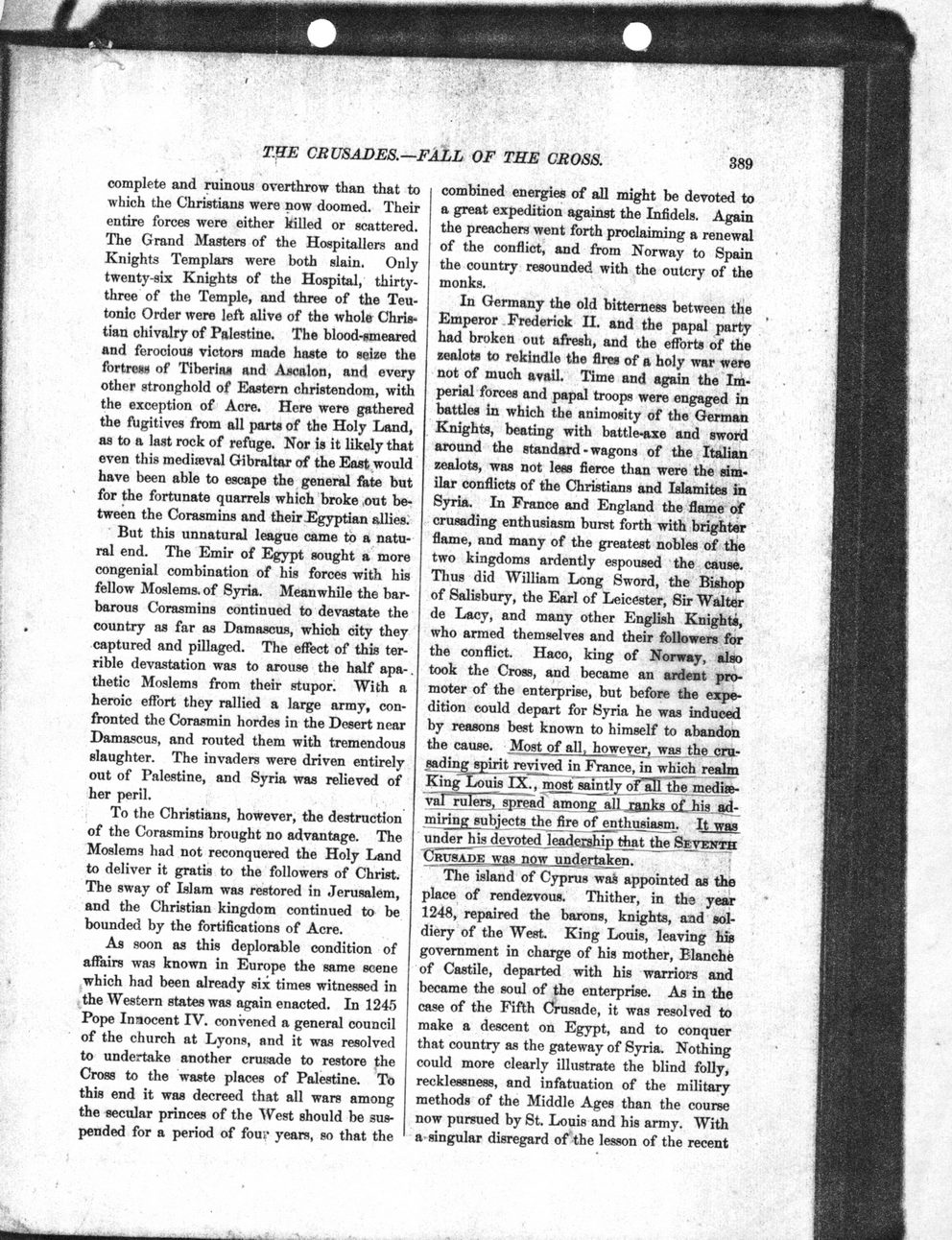This text was obtained via automated optical character recognition.
It has not been edited and may therefore contain several errors.
THE CRUSADES.—FALL OF THE CROSS. 389 complete and ruinous overthrow than that to which the Christians were now doomed. Their entire forces were either killed or scattered. The Grand Masters of the Hospitallers and Knights Templars were both slain. Only twenty-six Knights of the Hospital, thirty-three of the Temple, and three of the Teutonic Order were left alive of the whole Christian chivalry of Palestine. The blood-smeared and ferocious victors made haste to seize the fortrens of Tiberin* and Ascalon, and every other stronghold of Eastern Christendom, with the exception of Acre. Here were gathered the fugitives from all parts of the Holy Land, as to a last rock of refuge. Nor is it likely that even this mediaeval Gibraltar of the East would have been able to escape the general fate but for the fortunate quarrels which broke ,out between the Corasmins and their .Egyptian allies. But this unnatural league came to a natural end. The Emir of Egypt sought a more congenial combination of his forces with his fellow Moslems, of Syria. Meanwhile the barbarous Corasmins continued to devastate the country as far as Damascus, which city they captured and pillaged. The effect of this terrible devastation was to arouse the half apa-. thetic Moslems from their stupor. With a heroic effort they rallied a large army, confronted the Corasmin hordes in the Desert near Damascus, and routed them with tremendous slaughter. The invaders were driven entirely out of Palestine, and Syria was relieved of her peril. To the Christians, however, the destruction of the Corasmins brought no advantage. The Moslems had not reconquered the Holy Land to deliver it gratis to the followers of Christ. The sway of Islam was restored in Jerusalem, and the Christian kingdom continued to be bounded by the fortifications of Acre. As soon as this deplorable condition of affairs was known in Europe the same scene which had been already six times witnessed in the Western states was again enacted. In 1245 Pope Innocent IV. convened a general council of the church at Lyons, and it was resolved to undertake another crm»de to restore the Cross to the waste places of Palestine. To this end it was decreed that all wars among the secular princes of the West should be suspended for a period of four years, so that the combined energies of all might be devoted to a great expedition against the Infidels. Again the preachers went forth proclaiming a renewal of the conflict, and from Norway to Spain the country resounded with the outcry of the monks. In Germany the old bitterness between the Emperor Frederick H. and the papal party had broken out afresh, and the efforts of the zealots to rekindle the fires of a holy war were not of much avail. Time and again the Imperial forces and papal troops were engaged in battles in which the animosity of the German Knights, beating with battle-axe and sword around the standard-wagons of the Italian zealots, was not leas fierce than were the similar conflicts of the Christians and Islamites in Syria. In France and England the flame of crusading enthusiasm burst forth with brighter flame, and many of the greatest nobles of the two kingdoms ardently espoused the cause. Thus did William Long Sword, the Bishop of Salisbury, the Earl of Leicester, Sir Walter de Lacy, and many other English Knights, who armed themselves and their followers for the conflict. Haco, king of Norway, also took the Cross, and became an ardent promoter of the enterprise, but before the expedition could depart for Syria he was induced by reasons best known to himself to abandon the cause. Most of all, however, was the crusading spirit revived in France, in which realm KingLouis IX., most saintly of*affthe medise-varlrulers^ spread among all jacks of. his admiring subjects the fire of enthusiasm. It was under his devoted leadership that the Seventh Crusade was now undertaken. The island of Cyprus was appointed as the place of rendezvous. Thither, in the year 1248, repaired the barons, knights, and soldiery of the West. King Louis, leaving his government in charge of his mother, Blanche of Castile, departed with his warriors and became the soul of the enterprise. As in the case of the Fifth Crusade, it was resolved to make a descent on Egypt, and to conquer that country as the gateway of Syria. Nothing could more clearly illustrate the blind folly, recklessness, and infatuation of the military methods of the Middle Ages than the course now pursued by St. Louis and his army. With a singular disregard of the lesson of the recent

King Louis IX Bourbon The-Crusades-(1)